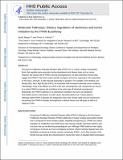Molecular Pathways: Dietary Regulation of Stemness and Tumor Initiation by the PPAR- Pathway
Author(s)
Beyaz, Semir; Yilmaz, Omer
Downloadnihms827156.pdf (626.7Kb)
OPEN_ACCESS_POLICY
Open Access Policy
Creative Commons Attribution-Noncommercial-Share Alike
Terms of use
Metadata
Show full item recordAbstract
Peroxisome proliferator-activated receptor delta (PPAR-8) is a nuclear receptor transcription factor that regulates gene expression during development and disease states, such as cancer. However, the precise role of PPAR-8 during tumorigenesis is not well understood. Recent data suggest that PPAR-8 may have context-specific oncogenic and tumor-suppressive roles depending on the tissue, cell-type, or diet-induced physiology in question. For example, in the intestine, pro-obesity diets, such as a high-fat diet (HFD), are associated with increased colorectal cancer incidence. Interestingly, many of the effects of an HFD in the stem and progenitor cell compartment are driven by a robust PPAR-8 program and contribute to the early steps of intestinal tumorigenesis. Importantly, the PPAR-8 pathway or its downstream mediators may serve as therapeutic intervention points or biomarkers in colon cancer that arise in patients who are obese. Although potent PPAR-8 agonists and antagonists exist, their clinical utility may be enhanced by uncovering how PPAR-8 mediates tumorigenesis in diverse tissues and cell types as well as in response to diet.
Date issued
2016-10Department
Koch Institute for Integrative Cancer Research at MITJournal
Clinical Cancer Research
Publisher
American Association for Cancer Research (AACR)
Citation
Beyaz, S. and O. H. Yilmaz. “Molecular Pathways: Dietary Regulation of Stemness and Tumor Initiation by the PPAR- Pathway.” Clinical Cancer Research 22, 23 (October 2016): 5636–5641 © 2016 American Association for Cancer Research
Version: Author's final manuscript
ISSN
1078-0432
1557-3265